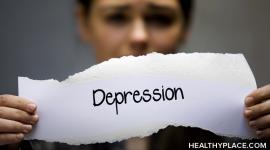Can You Help Me Understand Depression? Depression Explained

Understanding depression isn’t easy thanks to the frustrating, discouraging nature of depression. Depression does have a definition and a set of symptoms and features that specify its duration and intensity. Here is a clinical description from the American Psychiatric Association’s Diagnostic and Statistical Manual of Mental Disorders, Fifth Edition (DSM-5):
“[Depressive disorders involve] the presence of sad, empty, or irritable mood,
accompanied by somatic and cognitive changes that significantly affect the
individual’s capacity to function.” (p.155)
This description provides an intellectual conceptualization of depression, but it really doesn’t do it justice. A clinical description can’t explain depression’s depth, what it feels like to live with it, or what it does to someone’s life. To truly understand depression, it’s necessary to go beyond the clinical criteria and descriptions. It is the only way depression can be explained.
Depression Explained: What Depression is Like and What It Does to People
Everyone experiences some of the characteristics of depression from time to time. Negative thoughts and emotions, low mood, and fatigue are part of the human condition. Sometimes we react negatively to people, situations, and events. We feel upset and down. Sometimes, we might even use the word “depressed” to describe how we’re feeling. This is not depression.
Words like “sad,” “tired,” “lethargic,” and “unmotivated” are sometimes used to explain depression. These words aren’t wrong, but they fall short. They don’t help anyone understand depression. Perhaps that’s because depression is a state of being that is beyond adjectives.
To understand depression, it helps to empathize with those who live with it, to imagine what it’s like to go through what they are experiencing. Depression causes people, against their will and contrary to what they’d normally choose, to:
- Withdraw from life, turning away from their family, friends, activities, and interests
- Cease or minimize engagement with people, work, school, home, and the responsibilities and pleasures that go with them
- Blame themselves for many, many things and hate themselves for them all
- Feel worthless, like a failure who doesn’t deserve happiness, friendships, love, or other good things in life
- Think negative thoughts and believe those negative thoughts
- Shut down out of sheer exhaustion and feeling utterly overwhelmed by themselves and life
To help understand depression, think of it as a prolonged, crushing despair. Depression is more than that, though. It’s chronic pain of mind and body: psychological pain involving feelings and thoughts as well as physical pain involving any part or system of the body. This makes perfect sense, as some regions of the brain are involved in both physical and psychological pain, causing overlapping agonies. The pain of depression makes it nearly, if not completely, impossible to live life fully or participate in being you.
What someone experiences with depression is real. It’s not made up for attention or an overreaction to a problem or a personal weakness. People go through what they do for a different reason.
Depression Understanding: Depression Is a Genuine Illness
Depression is an illness like any other physical or mental illness. While its effects are felt throughout the body, it’s the organ we call the brain that experiences problems that manifest as depression.
The biological illness is due in part to imbalances in the brain. These chemical imbalances throw off the body’s natural rhythms and behaviors. Appetite is off-kilter. Circadian rhythms important to sleep functions are disrupted. Rhythms that govern sexual functioning aren’t functioning correctly, either. These key biological functions experience imbalances that result in eating, sleeping, and sexual behavior changes that then further throw off the brain’s neurochemistry. Depression has begun and continues to spiral downward.
Another dimension of illness suffered by the brain is its electrical nature. The brain, like the heart, is a bioelectrical organ with continual rhythms and cycles. One understanding of depression is as an arrhythmia of the brain. Arrhythmia causes misfiring and malfunctioning, one result of which is depression.
Understanding depression as an illness is a very good thing. It’s proof that it’s not a character flaw any more than having diabetes or heart disease is a character flaw. And, like any other illness, depression can be treated and improved and the person living with this illness can get their life back.
Among recognized illnesses and diseases, depression is one of the most prevalent. It ranks fourth on the list of the most common diseases in the entire world (neuroCare, n.d.). This means that if you are living with depression, you are far from alone. There’s a world of people who can empathize with what you’re experiencing.
Because there are so many people living with the illness that is depression, understanding depression is important. And when depression is explained humanely rather than clinically, we’re all better equipped to open our hearts and help those suffering from depression know that they are worthy of kindness, understanding, and healing.
APA Reference
Peterson, T.
(2022, January 3). Can You Help Me Understand Depression? Depression Explained, HealthyPlace. Retrieved
on 2025, April 20 from https://www.healthyplace.com/depression/depression-information/can-you-help-me-understand-depression-depression-explained



